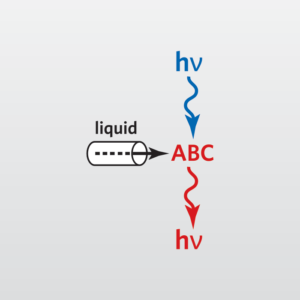Gel Permeation Chromatography (GPC)
Home » Our Techniques » Chromatography » GPC
Gel Permeation Chromatography (GPC) is an analytical technique for the characterization of a wide variety of polymers or other macromolecules in a mixture.
In GPC, a solution of dissolved sample is passed through a column with a controlled-porosity packing, typically a polymeric porous gel (typically referred to as a “stationary phase”). The size and shape of the molecule dictates the materials ability to interact with the stationary phase pores. Small molecules typically interact and enter the pores without difficulty and therefore take the longest to elute from the column. Molecules with a very large molecule weight cannot interact with or move into the pore spaces available in the stationary phase and elute relatively quickly. Using this form of size exclusion chromatography, a wide range of molecular weights can be characterized when compared to retention times of standard molecular weights.
At EAG, a number of GPC chromatographic techniques and detectors are available.

GPC data and interpretations have helped solve issues in diverse products ranging from medical devices and pharmaceuticals to toys and industrial goods.
Ideal uses of GPC
- Molecular weight and molecular weight distribution of macromolecules
- Sample purity determination
- Polymerization kinetics examination
- Quality assurance and control
- High molecular weight quantitations
- Medical device chemical characterization via ISO 10993:18
Strengths
- Capable of using solvents ranging from aqueous to non-polar
- Capable of measuring polymers from a few hundred to several millions of Daltons
- Capable of measuring molecular sizes (called absolute molecular weight)
- Multiple detectors ranging from refractive index to light scattering and viscometry
- Temperature analysis ranges from ambient to 220°C
- Characterize polymers and separate mixtures into discrete fractions, such as polymer, oligomer, monomer and any non-polymeric additives
Limitations
- A limited number of peaks can be resolved within the time scale of the GPC run
- The molecular masses of most of the chains will be too close for the GPC separation to show anything more than broad peaks
- Filtration must be performed before using the instrument to prevent dust and other particulates from running the columns and interfering with the detectors. This may cause a chance to removing higher molecular weight sample before it can be loaded on the GPC column
- There are not polymer standards for every type of polymer, so standards with similar chemistry have to be used
GPC Technical Specifications
- A solvent pump, a degasser, an autosampler assembly, with a column compartment
- Different detectors are available: refractive index, light scattering and viscometer detector
- Temperature operation: 30-220°C
- Offer variety of standards: organic and aqueous GPC standards
- Control Software: Agilent GPC software, Malvern OmniSEC software
Examples of industies served
- Automobile
- Additives
- Adhesives
- Agrochemical
- Aerospace
- Biochemistry
- Cement
- Coating and Paint
- Food industry
- Lubricant
- Plastics and Packaging
- Petroleum
- Polymers
- Pharmaceuticals
- Rubber Industry
Would you like to learn more about using Gel Permeation Chromatography (GPC)?
Contact us today for your Gel Permeation Chromatography (GPC) needs. Please complete the form below to have an EAG expert contact you.